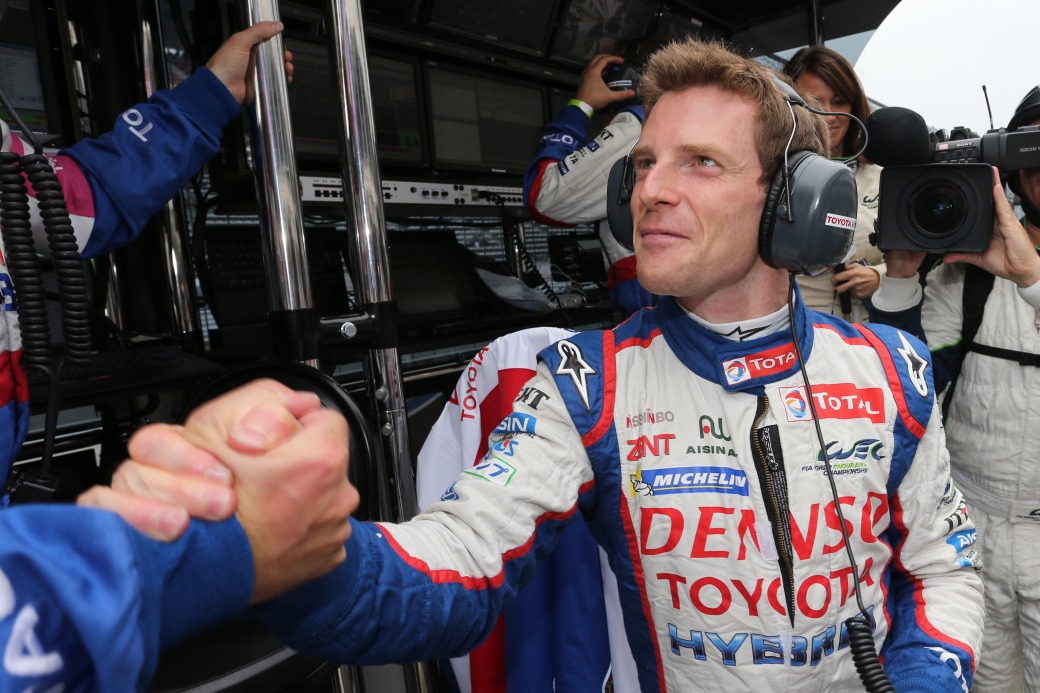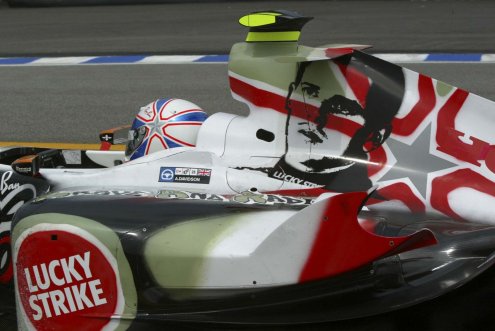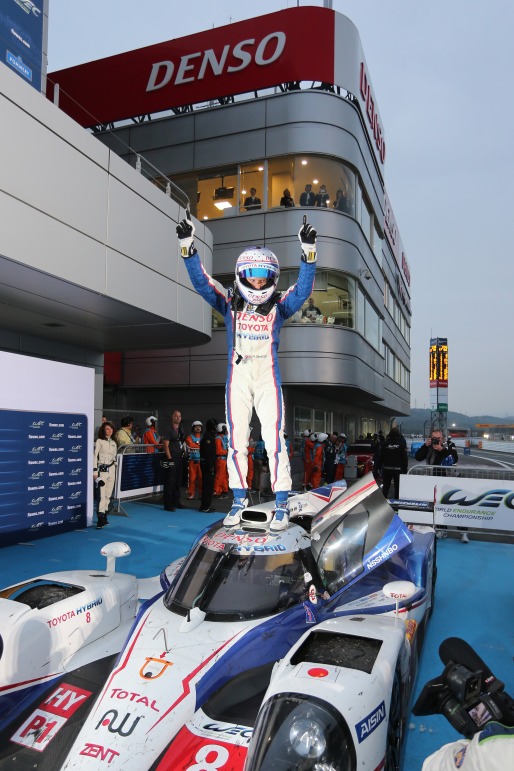(Interview by S.Murtas – written and published in January 2015)
After more than 15 years, and having raced in the most competitive series in the world, including 6 years in F1, 2014 FIA World Endurance champion Anthony Davidson recalls the times in karting with fond memories, as his real motorsport home.
One of the most talented British drivers of his generation, Anthony Davidson is at last World Champion. An honour that escaped him back in his karting days, and for which he never got a real chance in F1 hindered by blatantly inferior cars. After many years, Anthony looks up to Karting as his true home, to which is bound to return in future.

Anthony Davidson (GBR)
Toyota Hybrid Racing
World Endurance Championship. 6 Hours of Fuji. 9th-12th October 2013. Fuji Speedway, Japan.
“My motorsport career really started by chance, as I wasn’t really into racing. Helped by my father – who’s always been a motorsport fan – my older brother Andrew used to race go-karts and I guess it all went from there. I got to race a kart for the first time as my eighth birthday present, and we spent the day at Rye House, our local track. I guess my dad was really instrumental in me carrying on racing after that first experience, as I used to play football back then and I don’t think I would have necessarily asked to race.
In the beginning I did enjoyed it, but the crave to race karts really grew in me with time, as I discovered I was good at it. Karting offered me the opportunity to be and feel competitive despite my petite physique.”
Do you recall the moment you realized that racing, from being a simple hobby, became a priority, and indeed entailed career prospects? When did you say ‘this is what I want to do with my life’?
“I do, very clearly in fact. I just turned 14, racing had just started to become more serious, by that time I had dropped all the other activities like football and so on, and racing was the main thing. I remember I was racing Junior TKM, and even though I was very dedicated at school, it was then I knew racing was what I wanted to do for the rest of my life. Not necessarily single-seaters – I didn’t know how far I could go – but definitely racing. I was good at it, I was passionate about it, I was completely absorbed and I found it extremely hard to think about anything else.”
Was it more the speed factor, or the competition side of racing that had you so hooked up?
“Definitely the competition side. By that stage the ‘doing it for fun’ element was gone. I got the fun from winning, from beating people and proving I was the best. You see, being a smaller guy, sometimes getting bullied at school, racing was a place where size wasn’t an issue. Whether you’re big or small, you can win races. So karting represented an escape from my everyday life where I was just a small kid… and I was very good at it!”

1989 British Cadet Championships. Anthony on the final grid with his brother Andrew, Dan Wheldon sitting on front wheel and Jenson Button looking at the camera (picture courtesy of Denis Davidson)
With a career in Karting spanning from 1987 to 1999, reaching the peak of the sport and almost clinching the FA European title in 1996, which were your highlights?
“At national level, the highlight must be the double British Junior Championship title in 1994 and 1995, in both occasions beating Jenson Button. At international level, definitely the 1996 European Championship, where I finished 2nd to Giorgio Pantano by just one point, which still upsets me to this day! You’d think that once you move up to single-seaters you forget that kind of situations, but you never do. It’s amazing how I still feel about it after such long time, and how those memories are so vivid.”
The 1996 FA European Championship final round, disputed on 30th June on the Belgian circuit of Genk, saw Anthony start the first final on grid 9. He quickly got up to the lead, but as tyres grained, he slipped back to a disappointing 8th. Then, from 8th in the second final he moved up to the lead, but got knocked off by Pantano’s teammate. Showing absolute determination, he reeled in from a distant 7th place to take win, missing the title by a mere point!
How did you come so close to win it, and ended up blowing it?
“The thing is that I was so sure I would get that title – I remember it like it was yesterday. We were in Genk, right before the last two finals of the championship, and it had just rained. Being very light with very low central gravity in the kart, I was susceptible to front tyre graining. At the same time, due to my light-weight, I was able to carry a lot of speed into the corners and stop the kart using the front tyres as leverage. With the unfavourable track conditions, and my particular racing technique, I grained the tyres already in the first lap and finished outside the top-7. And that was the final that lost me the title.”
So which was the biggest rivalry throughout your Karting career?
“I wouldn’t say I really had a constant rival in karting, but the driver I spent most of my career with was Jenson Button, from 1988 on and off until 1997. We started in Cadets and followed each other up the ladder all the way to World Championship level. We then met up again in 2003 as team mates at B.A.R F1.”
As some of your equally talented colleagues, you found in Terry Fullerton a mentor that assisted you at the beginning of your international karting career. How instrumental was he in your progression?
“It was very important, definitely a big step in my career. I think Terry took racing to a whole new level in terms of professionalism. It definitely felt more serious racing for him. He could spot everything, every little mistake… in the days before telemetry, Terry encompassed the telemetry and human aspects all in one. There was really nowhere to hide, and that’s the thing that helped me ironed out all the imperfections.
I joined Terry as British Champion, I had the momentum, the results, and the confidence. But you had to be a special type of character not to get pushed down by him. He was a very influential, forceful guy, who could easily bring down a driver lacking confidence. Luckily it wasn’t my case, I managed to cope well with his hard ways. We had a good laugh together, we jelled pretty well, and we had good results.”
Quite remarkably, Anthony raced karts until 1999, aged 20 with few, less compelling attempts at the European and World FSA crowns. Then, a few races in single-seaters already in 1999, and the first real season in the 2000 Formula Ford European Championship finishing 3rd overall, and a superb 2nd in the Formula Ford Festival that same year.
“I had my stroke of luck past my teenage years, I didn’t manage to find a sponsor that would take me to single- seaters before, but it worked out well. For a while I thought I would continue to pursue my career in Karting, I couldn’t see a way past that phase, but I was quite happy to remain in Karting. I was paid as a professional driver racing for Biesse Kart, and I was really enjoying my life as a professional senior kart driver.”
What was your first impression of the single-seater world?
“It felt slow! Coming from Karting, it was shocking. It was such a different machine and the grip level was nowhere near what I was used to. The style of driving is also completely different. It’s all about inertia, momentum and being able to build up the speed. The sheer grip of the kart makes the entire single-seater experience a really tough one to get used to. But I knew I had to get to grips with it.”
It sounds as if you’re not too fond of the Formula Ford experience…
“I felt frustrated at times, particularly when I could not get the car to do what I wanted it to. There were times when I wondered whether I would ever be able to race a single-seater as well as I raced a kart. But as I built up experience, I figured it out and I didn’t do too badly.
The problem with the Formula Ford car was that to master it I was forced into learning a unique driving style that suited that car only – braking with the right foot – and once I moved to Formula 3 in 2001 I had to readapt, using late braking as I used to do in karting. It took me a while to get it right, I only had the possibility to go through this process during the races as tests were limited, but in the end I finished 2nd in the championship.”
Despite the frustration, Anthony did manage to master the Formula Ford car, learning vital technical notions essential for the set-up, and also winning the coveted Formula Ford Festival (a European version of the Macau Grand Prix) a classis British race which has seen some of the best Formula 1 drivers coming out on top.

2004 Brazillian Grand Prix-Friday practice,
Sao Paulo, Brazil.
23rd October 2004.
Anthony Davidson, BAR Honda 006, action.
World Copyright LAT Photographic.
Digital Image only (a high res version is available on request).
“After the season in Formula 3 where I took the runner-up title, Formula 1 called in the shape of the BAR Honda team. They put me in their young drivers program, and I was signed as Test driver.
Then, in 2002, my first opportunity to race in Formula 1 with the Minardi team, which I think was a mistake. I don’t think I was quite ready, plus the car was very difficult to drive, it was consistently slower than the BAR also lacking power steering. Being a small guy I found it really difficult to manhandle the car around, and that’s the reason why I failed to finish both races. I was a bit naïve, but at that time I couldn’t have known, and you don’t really expect anyone to turn down an offer to race in F1, as you don’t know if you’ll ever get that chance again.”
You spent six seasons in Formula 1 – from 2002 to 2008 – as Test Driver and then Official Driver. How would you rate your F1 experience? Do you have any regrets?
“I don’t really have regrets, apart from the Minardi drive in 2002, which didn’t have a positive impact on my career. Of course, back then I couldn’t know I would have been in F1 for so many seasons, let alone having the opportunity to race a full championship in 2007 with Super Aguri.
Looking back, I wish I had raced more in different classes while I was Test driver. But in reality F1 test-driving was a much more involved role than it is today, it was proper job. I was doing about 15,000 km just testing, so it was a lot of work. But I wish I did race as well, because when I got the opportunity to race in 2007 I was a bit race rusty. I had the speed, but in the thick of the action – where I used to thrive in Karting, F. Ford and F3 – I wasn’t as sharp as I once was. I missed that edge for the first half of the season… it took me that long to get back my confidence in racing wheel-to-wheel battles. Although the car wasn’t probably at the right level (unlike, say, Lewis who jumped straight into a performing McLaren in his first F1 season), still to this day I feel very lucky I had the opportunity to race in F1 and show my speed at the top level of motorsport. An experience which taught me a lot in terms of understanding technical information, which elevated me onto the fantastic career I’m having in Sportscars.”

Anthony Davidson (GBR) celebrates in parc ferme.
Toyota Hybrid Racing
World Endurance Championship. 6 Hours of Fuji. 9th-12th October 2013. Fuji Speedway, Japan.
A truly brilliant one, crowned the 2014 FIA World Endurance Championship. Was it difficult to change your mind-set and accept the transition from F1 to Sportscar racing?
“Not at all. I always respected all drivers and disciplines; of course I considered F1 as the pinnacle of motorsport, but the first time I jumped into a Sportscar, the Peugeot 908, in November 2008 I said to myself ‘this is a proper car!’ A massively powerful engine, 860hp, a lot of downforce, basically a Formula 1 car with a roof over your head. This is to show that there is (fun) life after F1.”
How does it feel to finally win a FIA World Championship?
“Actually, now that I think of it, the last proper championship I won was in Karting, back in 1995. Since then I’ve won big single-day races, but the feeling of accomplishment you get out of winning titles, and particularly World titles, is unparalleled. It’s something I’m very proud of, I’ve proved I’m one of the best Sportscar drivers in the world, and will stay in motorsport history forever. How important is it? I’m not sure. Probably not as important as if it had happened a few years ago. In perspective, it won’t change my career, it will stay with me as a fantastic achievement.
But I’m already focused on my next goal, the Le Mans race, which is the one race that keeps getting away. There’s something magical about one-day championships, and particularly Le Mans, and I still remember I had the chance of winning the World Karting Championship in FA in 1996… we were at South Garda circuit in Lonato, I lined up 3rd on the grid, I knew I had a great kart, but the engine didn’t start due to a problem to the ignition. As Jenson (Button, editor’s note) got knocked off in the first lap, we ended up sitting on the grass in disappointment, watching the entire race together.
I still look back to that race thinking that’s the one where I had a really good chance of winning the World Championship and it didn’t happen.”
You could always make up and give it a go with KZ karts, like Schumy did a few years ago…
“I truly respect what Michael did, because to be competitive at the sharp end of Karting is as tough as it gets… what Schumacher did was really exceptional! As my career permits, it’s definitely something I will love to do. It’s a funny sensation because as I approach the end of the season, I always look at karting and I usually go to indoor tracks, and every time I get into a kart it feels like coming home, after all this time.”